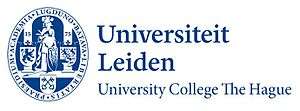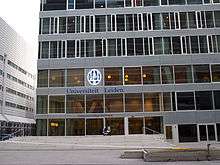Leiden University College The Hague
 | |
| Motto | Building knowledge for a better world |
|---|---|
| Established | 2009[1] |
| Dean | Prof. dr. Judi Mesman |
| Students | 600[2] |
| Address | Anna van Buerenplein 301 2595DG, The Hague, the Netherlands |
| Website | http://www.lucthehague.nl |

Leiden University College The Hague[3] offers BA & BSc (Honours) programmes in Liberal Arts & Sciences, which provide both broad, general education and in-depth specialization. The programmes address global issues, topics, theories and systems classified according to the broad domains of Peace, Justice and Sustainability. Interdisciplinary teachings and the use of real world cases are important characteristics of the curriculum. Students learn to understand relationships between fields of knowledge, and to approach complex issues from multiple and different perspectives. Throughout the curriculum students are challenged to further develop their academic, personal and cross-cultural communication skills.
Leiden University College The Hague has been established in close cooperation and with substantial support from the City of The Hague and is one of the pillars of Campus The Hague of Leiden University.
History
LUC started with its first cohort of 110 students in September 2010 at temporary academic and residential facilities, increasing its population with approximately 110 students per year in 2011 and 2012. In August 2013 LUC moved to its permanent location at Anna van Buerenplein in the centre of The Hague, where the academic and residential aspects are combined, and 200 students per year can be accepted.
Characteristics
- LUC The Hague is a residential college, located in The Hague, the ‘International City of Peace & Justice’.
- LUC The Hague offers a three-year BA & BSc programmes to a select group of highly qualified and motivated students.
- LUC The Hague has a focus on Peace, Justice and Sustainability as profiling elements in the curriculum.
- LUC The Hague aims high at academic excellence and sophisticated intellectual skills, such as scientific reasoning, research skills, presentation skills.
- LUC The Hague raises awareness of global citizenship, providing tools for international and cross-cultural communication.
- LUC The Hague integrates the best traditions of the Liberal Arts & Sciences: a broad, interdisciplinary approach to education, intensive small group tutoring, in an international setting.
- LUC The Hague is a joint initiative of Leiden University and the City of The Hague.
Educational Programme
The study programmes at Leiden University College The Hague (LUC The Hague) take three years of two semesters each. Each of the six semesters consists of two blocks.
Programme Components
The Liberal Arts & Sciences approach to learning is aimed at training students to deal with the complexity, diversity and continuous change of present-day society. Students gain broad knowledge of the wider world, but also study one area of interest more deeply. Liberal Arts & Sciences education also trains academic and citizenship skills. Within the framework provided by the institution, the students have the responsibility to compose their own individual programme. The programmes at LUC The Hague involve the following elements:
General Education This part of the curriculum is compulsory for all students and starts in the first semester. It consists of four courses on Global Challenges: Peace, Sustainability, Justice and System Earth which combine social science, humanities, and natural science. These courses not only introduce the two main themes of the programme in an interdisciplinary way, they also train students in academic skills. The fifth course in General Education is taken in either the first or second semester: History of Philosophy.
Academic Skills The development of Academic Skills is an essential part of the LUC The Hague curriculum. All students learn to present and write in sophisticated academic English, they work on their quantitative and qualitative research skills and their mathematical skills are also trained. In the second year two more research methodology courses are taken as part of the major.
Global Citizenship Students at LUC The Hague study topics, challenges and problems related to a globalizing world. The Global Citizenship component of the programme challenges them to reflect and act upon their own position and background in this world. In the first year all students take ‘Introduction to Area Studies’, after which they either continue with language study (Chinese, Arabic, French, Spanish, Russian) or with the study of culture, linguistics, literature or art from various parts the globe.
Electives Electives are courses that students can choose themselves: they can decide to take more courses in the field of their major, go on exchange, do a minor or spend more time on learning a new language.
Majors[4] The LUC The Hague majors all have their own perspectives on Global Challenges and offer a framework within which students attain a degree of depth in disciplines while integrating knowledge from sophisticated interdisciplinary standpoints. The majors can all be linked to at least one of the LUC The Hague themes: Peace, Justice or sustainability. The majors are:
- Human Diversity(BA)
- International Justice(BA)
- World Politics(BA)
- Earth, Energy and Sustainability(BSc)
- Global Public Health(BSc)
- Governance, Economics and Development(BSc)
Minors[5]
- Business and Entrepreneurship(BSc)
- Gender Studies(BA)
- Journalism(BA)
- Languages(BA)
- Psychology(BSc)
- TU Delft Minor:Green Blue City- Future Proof Neighborhoods(BSc)
The Hague: International City
An essential component of the Liberal Arts & Sciences philosophy is residential life. The international composition of LUC The Hague fully immerses students in a multi-cultural community, with all the pleasures and challenges that come with it. The educational and housing facilities enable students to co-operate easily with other students, meet outside the classroom, and organise their own social and cultural activities. These activities are mainly organised through LUC's own student association, Fortuna.
College in the Heart of the City LUC The Hague is part of Campus The Hague, Leiden University’s rapidly growing second site. The college building is located in the prestigious Lange Voorhout in the historical heart of the city. The facilities include space for teaching, social and cultural events, study- and group work areas, catering services and IT-facilities.
Student Housing In the first two years at LUC The Hague, students live in custom-built student housing facilities at Leeghwaterplein, located close to The Hague’s international train station, Den Haag HS. There are two buildings: Stamkartstraat and De Klok. De Klok is larger but also houses students from other programs of Leiden University, whereas Stamkartstraat is exclusive to LUC The Hague students. In the third (final) year of their study, the students can move to other student housing facilities in The Hague. In 2013, the new LUC campus at Anna van Buurenplein, next to The Hague Central Station, was opened. In this new location, living and teaching are combined.
References
- ↑ http://www.lucthehague.nl/about/what-is/introduction-luc.html
- ↑ http://www.lucthehague.nl/about/what-is/introduction-luc.html
- ↑ "Leiden University College The Hague". Lucthehague.nl. Retrieved 2012-09-10.
- ↑ https://studiegids.leidenuniv.nl/en/studies/show/3168/liberal-arts-and-sciences-global-challenges#tab1
- ↑ https://studiegids.leidenuniv.nl/en/studies/show/3168/liberal-arts-and-sciences-global-challenges#tab1
External links
- Homepage of Leiden University College The Hague
- Homepage of Campus The Hague (in English)
- Homepage of Campus The Hague (in Dutch)
- Homepage of Leiden University (in English)
- Homepage of Leiden University (in Dutch)
- (in English)